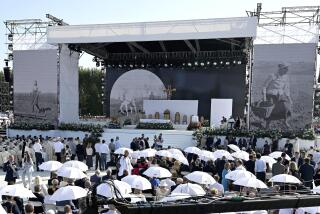Polish Women Breaking Out of Old Roles
- Share via
WARSAW, Poland — Her male colleagues read newspapers when she first spoke at government meetings, so Industry Minister Henryka Bochniarz decided she’d have to seize their attention.
She sharply criticized another Cabinet minister’s talk and the men put their papers down, Bochniarz, now a business consultant and president of the Polish Business Council, recalls with a smile.
With her short blond hair, tailored pantsuit and no-nonsense gaze, Bochniarz represents a new breed of woman emerging in Poland after decades of isolated communist rule.
Old customs and perceptions persist--men still open doors for women and kiss their hands--but exposure to Western social developments is beginning to challenge stereotypes in the home and workplace.
“It is not just about professionalism,” Bochniarz says. “It’s about state of mind.”
Today’s Polish woman faces choices unheard of just 10 years ago, when traditional roles of the pre-communist era--the good mother and strong woman behind her working, freedom-fighting man--had been skewed by communist principles of an inclusive working class.
Women worked alongside men in state-owned factories. Then they returned home to the traditional jobs of fixing dinner, bathing the kids and cleaning the house.
Now more Polish women marry later, have fewer children, spend most of their time away from home and generally assert their independence.
“There is no way back,” says Krystyna Kofta, who meets with women all over Poland to write articles for Twoj Styl (Your Style), Poland’s leading women’s magazine. “They want to break free. I can see it. Even if mothers cannot do it now, their daughters will.”
Open borders since 1989 have given Poles a clear view West, where they see women juggling family and career. And sweeping reforms toward a market economy have meant shifting industries with new opportunities.
Beata Stelmach began her career in 1991 when the Warsaw Stock Exchange was created.
“There were not many specialists. We all started from the same level. Everybody was evaluated on merit. It was a chance for everybody,” says Stelmach, now spokeswoman for the government’s Securities and Exchange Commission.
The new conditions didn’t bring automatic change for women, says Anna Achmatowicz, deputy editor in chief of Twoj Styl, which started in 1990.
“We had to make them realize their rights, that they don’t have to accept anything,” she says.
The magazine’s early stories explained “everything from A to Z,” such as how to do self-examinations for breast cancer and how to use the Internet, Achmatowicz says.
Advice also is coming from a growing array of international women’s magazines like Cosmopolitan, Marie Claire and She, which have started Polish-language editions.
“We scream to them: You are great and you can do anything you want,” says Grazyna Olbrych, editor in chief of the Polish edition of Cosmopolitan, which has been on the market since early 1997.
Not everyone likes the changes.
The Solidarity-led government, with strong links to the Roman Catholic Church, wants to preserve the traditional model of large families with women caring for the home and children.
Parliament is dithering over a proposed law on equal status of the sexes, which would allow women to sue employers for sex discrimination. Women account for 61% of Poland’s almost 1.7 million jobless adults.
The government also has resisted sex education programs for teenagers, and it cut subsidies for contraception pills that made them cheaper. Instead, Family Issues Minister Kazimierz Kapera proposed subsidizing Viagra “to boost births in our homeland.”
A government report on families released in July condemned modern women’s magazines for promoting the “model of individual career instead of family culture which . . . frustrates deeply Polish women.”
Olbrych, the Cosmopolitan editor, responds: “The main complaint against us is: You tell women they should decide about themselves.”
Some women have done just that. Since 1989, births have dropped 38% among urban women aged 20-24, while the marriage rate in cities is down 22%, according to the government family report.
The gap between men’s and women’s pay has narrowed from 35% in 1981-82 to 25% in the mid-1990s, says Henryk Domanski, a professor at the Polish Academy of Sciences who has studied the issue since 1992.
Leszek Wrobel, head of the Accord hiring agency in Warsaw, says more women are seeking work.
“They are better prepared each year. They look more professional and know how to sell themselves,” Wrobel says. “Media show successful women who are well off and independent. They have examples to follow.”
But stereotypes persist. The most popular television soap opera, “Klan,” portrays women in common roles--betrayed wife, anguished mother searching for her son, inexperienced girl seduced by a married man.
Kasia Uszak, a law school graduate who moved to Warsaw from Szczecin to work for an investment firm last January, earns five times what she did in Szczecin. But her new status makes little impression back home.
“Acquaintances say that I am already an old maid and that I aim too high,” she says. “They say I should devote myself to husband and kids, or at least to getting those.”
More to Read
Sign up for Essential California
The most important California stories and recommendations in your inbox every morning.
You may occasionally receive promotional content from the Los Angeles Times.










